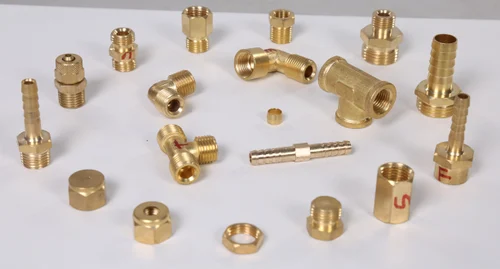What Purposes Do Brass Fittings Serve?

Brass fittings are a critical component of many industrial systems, providing a secure and reliable connection between different components. The versatility and durability of brass fittings make them a popular choice across a range of industries, including plumbing, construction, automotive, marine, and electrical. From connecting pipes and valves in plumbing and construction systems to joining wires and cables in electrical applications, fittings serve a variety of purposes in different industries. Here in this blog, we will explore the multiple benefits and applications of brass fittings and why they are an essential component for many industrial systems.
Plumbing
The utilization of brass fittings in the plumbing industry is quite common, as they are highly resistant to corrosion and able to withstand high water pressure. These fittings are used for connecting pipes, valves, and fixtures, and their versatility allows them to be utilized in both hot and cold water systems. The installation process is very easy and the fittings provide a secure, leak-free connection.
One of the significant advantages of brass fittings in plumbing systems is their ability to adapt to various environmental factors. They can withstand extreme temperatures, harsh water conditions, and high water pressure.
Additionally, they are highly resistant to chemical corrosion caused by different plumbing chemicals, such as acidic or alkaline water. As a result, they are an excellent choice for use in a wide range of plumbing applications, ranging from household systems to commercial and industrial systems.
Construction
The construction industry widely utilizes brass fittings to connect various building components such as pipes, valves, and fixtures. They are highly preferred due to their excellent durability and resistance to corrosion. They are available in various shapes, sizes, and configurations, making them easy to use and versatile.
Brass fittings are mainly used in construction applications to connect copper pipes, as copper is an excellent conductor of heat and electricity. This combination provides an efficient system for carrying water, gas, and other fluids in a building. The versatility of brass fittings makes them ideal for use in a wide range of construction applications, from residential buildings to commercial and industrial structures. Furthermore, brass fittings are resistant to environmental factors such as temperature changes and chemical corrosion, making them an ideal choice for construction applications.
Marine
The marine industry is one of the many industries that rely on brass fittings for connecting various components in boats, including pipes, valves, and fixtures. The preference for brass fittings in the marine industry is due to their high resistance to corrosion and their ability to withstand harsh marine environments. The installation process of these fitting is straightforward, and they provide a tight and leak-free connection.
Brass fittings are mainly used in marine applications to connect different systems, such as fuel lines, water systems, and air conditioning systems. Additionally, they are essential in marine plumbing systems, including greywater and septic systems. The durability and corrosion resistance of brass fittings makes them an ideal choice for use in harsh marine environments, where corrosive elements like salt water can quickly degrade metal components.
Electrical
The electrical industry uses brass fitting to connect electrical components, including wires, cables, and conduits. They are preferred for their high conductivity, resistance to corrosion, and durability. They are easy to install and offer a tight, leak-free connection. In electrical applications, brass fittings are mainly used to connect wires and cables in buildings and machinery. They are also used to connect conduits and electrical panels. The high conductivity of brass fittings ensures efficient electrical performance, while their corrosion resistance and durability make them ideal for use in harsh environments.
The Versatility and Benefits of Brass Fittings in Industrial Applications
Brass fittings are a crucial component in various industrial systems, providing a reliable connection between different components. The advantages of brass fitting, including their resistance to corrosion, durability, and versatility, make them a popular choice in plumbing, construction, marine, and electrical industries. In addition, brass fittings are cost-effective, easy to install, and maintain, providing a secure and leak-free connection.
Another benefit of brass fitting is their eco-friendliness, as they are fully recyclable and can be reused in the manufacturing of new brass products. This feature makes brass fittings a sustainable choice and contributes to more environmentally conscious industrial operations. Moreover, brass fittings are easy to fabricate, allowing for customized designs and configurations to meet specific application needs.
Conclusion
In summary, brass fittings are highly versatile and widely used in various industries, including plumbing, construction, and marine. Their high durability, resistance to corrosion, and ability to withstand harsh environments make them a popular choice for connecting different components such as pipes, valves, and fixtures.
Brass products, parts, and components are also highly valuable for their recyclable properties, as they can be easily turned into brass scrap and used in the manufacturing of new brass products. For industries that rely on brass fittings, working with a reputable supplier like Sneh Metal can ensure high-quality brass components that meet their specific needs and standards.

